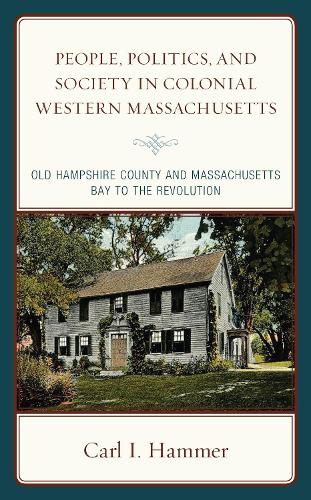
People, Politics, and Society in Colonial Western Massachusetts: Old Hampshire County and Massachusetts Bay to the Revolution
(Hardback)
Publishing Details
People, Politics, and Society in Colonial Western Massachusetts: Old Hampshire County and Massachusetts Bay to the Revolution
By (Author) Carl I. Hammer
Bloomsbury Publishing PLC
Lexington Books
5th February 2021
United States
Classifications
Professional and Scholarly
Non Fiction
Revolutions, uprisings, rebellions
Local history
974.402
Physical Properties
Hardback
266
Width 162mm, Height 228mm, Spine 26mm
572g
Description
Examining the colonial history of western Massachusetts, this book provides fresh insights into important colonial social issues including African slavery, relations with Native Americans, the experiences of women, provisions for mental illness, old age and higher education, in addition to more traditional topics such as the nature of colonial governance, literacy and the book trade, Jonathan Edwards ministries in Northampton and Stockbridge, and Governor Thomas Hutchinsons efforts to prevent a break with Britain.
Reviews
The settlements on either side of the Connecticut River have long been the neglected step-children of colonial Massachusetts history. Those seeking information on the important events that transpired there (bitter religious controversy, intermittent warfare, growing revolutionary sentiment, and the trend toward manumission) needed to search out clues in dusty antiquarian local histories and reverential family genealogies. Now the valley has received the historical attention it long deserved in a series of well-written scholarly essays by Carl I. Hammer.
-- John W. Tyler, Colonial Society of MassachusettsCarl I. Hammer has made a welcome and richly-textured contribution to the growing literature on the history of early western Massachusetts. By focusing on particular characters and groupsAfrican slavery, relations with the Natives, the experiences of women settlers as well as the political and religious leadershiphe highlights the surprisingly diverse history of this long-neglected region. This area, still very much a frontier through the eighteenth century, emerges in the pages of this study as unique and as a time and place that still has much to teach and to reveal.
-- Kenneth P. Minkema, Yale UniversityCarl I. Hammers deeply-researched study of Hampshire County traces in extraordinary detail the first century of a colonial settlement. Through multiple biographies and institutional investigations, he uncovers the complicated religious, political, and economic developments that shaped early western Massachusetts, up to the American Revolution. With probing attention to the histories of indigenous and African American peoples in the region, Hammer presents a compelling interpretation of how modern forces shaped the colonial-American backcountry.
-- Daniel Livesay, Claremont McKenna CollegeAuthor Bio
Carl I. Hammer is research associate at the University of Pittsburgh.
